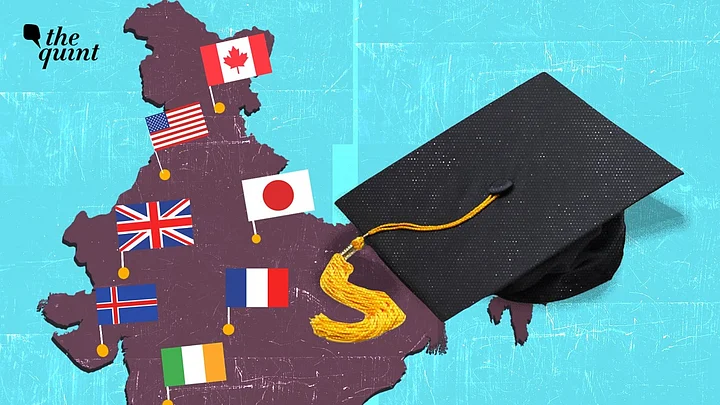The University Grants Commission (UGC) is all set to invite foreign universities to set up their campuses in India. The development comes as part of the National Education Policy (NEP) 2020.
On Thursday, 5 January, UGC Chairman, Mamidala Jagadesh Kumar, released the draft regulations for setting-up and operation of Campuses of Foreign Higher Educational Institutions in India. The commission has invited feedback on the same from stakeholders by 18 January, 2023.
So, what kind of universities will be allowed to set-up their campuses in India? What will be the eligibility criteria? What will be the admission process and fee structure? What kind of programmes will be offered? Here is everything you need to know.
What will be the eligibility criteria for foreign universities and institutes to set up their campuses in India?
The UGC chairman, while discussing the the draft, said that universities who want to set up their campuses in India should have secured a position within the top 500 of overall or subject-wise global rankings. Universities, who have secured subject-wise ranking, will be allowed to offer same subjects in their Indian campuses.
He also clarified that universities and institutes, which do not participate in global rankings, but are reputed institution in its home jurisdiction, will also be considered for setting up campuses in India.
What will be the admission process in these universities?
Kumar also stated that all the foreign institutes setting up campuses in India will have the autonomy to formulate their own admission process to admit Indian and foreign students.
Will these institutes provide reservation to students on the basis of caste, financial capability, sex, or nationality?
The draft regulation does not mention anything about whether foreign universities coming to India will follow reservation norms as followed by Indian institutes.
While answering a question about the same, Kumar just reiterated that these universities will have the autonomy to set up their own admission policies, and UGC will not have any say in it. Therefore, they can choose to provide or not provide reservation for certain students in their Indian campuses.
What will be the fee structure in these universities, and will students get any scholarships?
Just like admission policies, the universities will also be allowed to decide their own fee structure. However, the draft states that the fee structure should be "should be transparent and reasonable."
As per the details released till now, the Indian government will not provide any scholarships to students taking admissions in foreign university campuses in India.
However, based on an evaluation process, the universities and institutes may provide, full or partial 'need-based scholarships' to its students from funds such as endowment funds, alumni donations, tuition revenues, and other sources.
What kind of courses will these universities and institutes offer?
Foreign institutes will be allowed to offer undergraduate, postgraduate, doctoral, post-doctoral, and other programmes, and award degrees, diplomas, and certificates in all disciplines.
Moreover, Kumar also stated that all the universities willing to come to India, will have to set-up campuses and offer offline programmes. They will not be allowed to impart education through online or Open and Distance Learning (ODL) mode.
When will these campuses start their operations in India?
A detailed timeline of when foreign universities and institutes will begin their operations in India is yet to be revealed. The draft regulation will be finalised first, and then notified by the government. The same is expected to be done before the first half of 2023.
After which, UGC will begin with the application process. After they get the approval from UGC, they will be provided two years to set-up their campus. However, if needed, they can seek time extension from UGC to set up their campus in India.
Will these foreign institutes hire Indian faculties and staff members?
The draft states that the Foreign Higher Educational Institutions will have the autonomy to recruit faculty and staff from India and abroad as per its recruitment norms.
They will also be allowed to decide the qualifications, salary structure, and other conditions of service for appointing faculty and staff.
However, the institutes must ensure that the qualifications of the faculty appointed at their Indian campuses shall be at par with the main campus of the country of origin, and the foreign faculty appointed to teach at the Indian campus shall stay at the campus in India for a reasonable period.
How long will these universities be allowed to operate in India?
All foreign universities and institutes will be initially granted permission for a period of ten years. The institute can apply for renewal of the operations of the campus at least one year before the expiry of the approved period. The power to provide extension will be vested upon UGC.
Will these institutes and universities have the autonomy to design their own curriculum?
Foreign Higher Educational Institutions coming to India will have the autonomy to decide there own curriculum.
However, UGC will examine the programme to ensure its quality.
The draft also mentions that:
"The Foreign Higher Educational Institutions shall not offer any such programme of study which jeopardises the national interest of India or the standards of higher education in India."
Answering a question about the interpretation of the term 'national interest' and chances of it getting misused, Kumar said that "let's not read too much into it. Also, if any conflict arises, then it shall be resolved according to the laws by Indian judiciary."
"The Commission shall decide any question as to the interpretation of these regulations, and its decision shall be final and binding in the matter," the draft added.
(At The Quint, we question everything. Play an active role in shaping our journalism by becoming a member today.)
